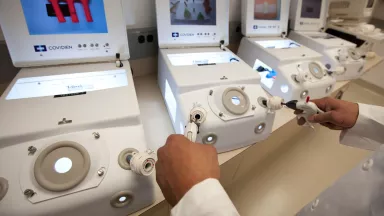Shoulder: General Questions
Generally, your first appointment with the surgeon will involve an evaluation that takes into account your medical history, current symptoms and an examination of the injured area. If X-rays are required, they can be taken the same day. In some cases, additional tests will be recommended and, once authorized, can be scheduled for a later date.
Any relevant medical information, including diagnostic reports and images, will help us better evaluate your condition. If you have these available as digital files, please bring them with you to your first visit.
Additionally, please bring the following:
- Insurance card
- Photo ID
- Outside medical records
- Outside slides with pathology reports
- Referring physician contact information
- Primary care provider contact information
- Pharmacy contact information
Please plan to arrive at least 15 minutes before your scheduled appointment to allow for the registration and insurance verification process. We understand staying on schedule is important to our patients, and your early arrival helps ensure we can see all our patients in the timeliest manner possible.
Insurance policies differ from patient to patient, and coverage will depend on both the procedure and your individual policy. The surgeon’s office will always obtain authorization in advance of any surgical procedure; however, we advise you to speak with your insurance representative to discuss patient responsibility, co-pays and other important coverage details.
If any changes are due to take place to your insurance coverage prior to or near your date of surgery, please notify us immediately. Authorization, which can take time, may need to be obtained from your new insurance company. Failure to inform us of these changes could result in the cancellation or postponement of your surgery.
Yes. Generally, there are a number of individuals who can assist you with forms and paperwork. Often, it is best to bring these materials to your surgeon’s office before surgery. Please consult your for specific instructions.
Shoulder: Preparing For Your Surgery
Your surgeon might recommend shoulder arthroscopy if you a have a painful condition that has not responded to non-surgical treatments, such as rest, physical therapy or inflammation-reducing medications/injections. Shoulder arthroscopy may be appropriate for management of injured structures, such as the rotator cuff tendon, labrum, articular cartilage and other soft tissues surrounding the joint.
Shoulder replacement surgery is most commonly used for severe degenerative joint disease (osteoarthritis) or inflammatory disease (rheumatoid arthritis). A shoulder replacement is performed to alleviate pain, stiffness and swelling, and it can help improve the shoulder joint’s range of motion in select patients.
The two most common types of shoulder replacements are anatomic and reverse, both of which remove the diseased cartilage and resurface the joint using two artificial components.
An anatomic total shoulder replacement substitutes the ball of the shoulder joint with an artificial implant shaped with a smooth, round metal surface. The socket is replaced with a specialized plastic that is cemented into place. Less commonly, in cases where there is disease only on the humeral side, the ball alone is replaced in a procedure known as a partial replacement or hemiarthroplasty.
In a reverse total shoulder replacement, the normal structure of the shoulder is flipped or “reversed.” The ball portion of the implant is attached to the scapula, and the artificial socket is then attached to the humeral head. This makes the stronger deltoid muscles more effective and increases joint stability. This procedure is commonly utilized in patients with an irreparable rotator cuff or in the context of revision surgery.
Surgery is an invasive procedure that carries inherent risk. Prior to obtaining your written consent, your surgeon will discuss the surgery’s risks, benefits and alternatives. Risks related to anesthesia will be addressed by a member of the anesthesia team. Please speak with your surgeon or a member of their team if additional clarification is necessary.
Preparing for surgery is, to some extent, personalized, and will depend on the procedure being performed, as well as your medical condition. Some patients will need to obtain medical clearance from their primary care provider prior to surgery. On occasion, additional clearance from relevant specialists will be required to ensure patient safety. Preoperative testing—like blood work, electrocardiograms (EKGs), urine tests and chest X-rays—may also be necessary. Your surgeon or a member of their team will explain everything that's necessary in advance of surgery.
The night before surgery, thoroughly wash the area to be operated. This will decrease the risk of infection. You do not need to shave the area.
Please do not eat or drink after midnight on the evening before your surgery. Consuming food or liquids prior to anesthesia can be dangerous and, for safety reasons, may result in the postponement or cancellation of your procedure. If you have been instructed to take certain home medications on the morning of surgery, it is safe to do so with a sip of water. Pediatric patients may be allowed to have clear liquids, such as water, up to three hours prior to surgery. Milk and other non-clear liquids cannot be consumed after midnight on the evening before surgery. Please speak with your surgeon or a member of their team if additional clarification is necessary.
It depends. There are medications that need to be continued the morning of surgery and there are medications that must be discontinued. Prior to surgery, our nurses will advise which medications you should or should not take before your procedure. Please speak with your surgeon or a member of their team if additional clarification is necessary.
If you have digital files of your preoperative imaging, please bring them with you on the day of surgery. In addition, it is helpful to bring a list of medications you are currently taking. We also recommend that you bring something to read or occupy yourself with while you wait. For your own safety, we require that a friend or family member accompany you home following the surgery.
Please leave any jewelry, watches or other valuables at home for safekeeping. Although cell phones and clothing are stored in locked storage during surgery, we strongly advise against bringing valuables and other non-essentials with you.
The location will vary from patient to patient, depending on the type of surgery being performed. Generally, shoulder arthroscopies are performed at Hutchinson Ambulatory Surgery Center, located at 1250 Waters Place, Bronx, NY 10461. Open procedures, such as a shoulder replacement or fracture fixation, are generally performed at our Wakefield Campus, located at 600 East 233rd Street, Bronx, NY 10466. Prior to surgery, your surgeon’s office will provide specific instructions on where to go and when to arrive.
Generally, patients are required to check in one-and-a-half to two hours prior to surgery. The night before surgery, our staff will call to inform you what time to arrive. If surgery is scheduled for a Monday, you will be contacted on the Friday before surgery. If surgery is scheduled following a national holiday, you will be contacted on the last day the hospital is open before your surgery. If you do not receive a call by 4:00 p.m. on that day, you should contact your surgeon’s office or the Ambulatory Care Registration at 929-263-3477, as directed.
Both regional and general anesthesia can be utilized. Typically, regional anesthesia is preferred. The decision to use either regional or general anesthesia depends upon your own medical history and the type of surgery being performed. Your surgeon, together with the anesthesiologist, will help to decide what is most appropriate for you.
Shoulder: After Your Surgery
Post-operative hospital stays vary from patient to patient and depend on the procedure performed, as well as other variables. Your surgeon will discuss the anticipated post-operative management plan that is most appropriate for you.
Pain medication is often helpful following surgery but is not always necessary. If medication is required, your surgeon will provide you with a prescription. As most prescriptions are electronically submitted directly to the pharmacy, you will be asked to provide your pharmacy’s contact information in advance.
Post-operative care varies from patient to patient, and specific instructions depend on the procedure performed, as well as other variables. Generally, showers are permitted in the early post-operative period, but your surgeon will likely instruct you to keep the wound clean and dry. Please speak with your surgeon or a member of their team if additional clarification is necessary.
It is important that you wear your sling at all times in the early post-operative period. You will be allowed to remove your sling only for the purposes of showering and dressing. You will be permitted to actively flex and extend your elbow, wrist and fingers following your first post-operative visit.
In general, avoid things that make your shoulder hurt. Do not actively elevate or rotate your shoulder from a sitting or standing position until you receive specific permission to do so from your surgeon. If there are additional restrictions relevant to your condition or procedure, we will inform you of them at the time of your first post-operative appointment.
Physical therapy and rehabilitation are frequently ordered after surgery to help maximize a patient's functional outcomes. Your need for physical therapy or rehabilitation depends largely on the procedure performed and the nature of your condition. Please speak with your surgeon or a member of their team if additional clarification is necessary.
The beginning of your physical therapy will depend on a variety of factors, including the procedure performed and the findings from the surgery. Physical therapy following a conventional shoulder replacement, for example, will begin after your first post-operative visit. For more involved procedures, like an arthroscopic rotator cuff repair, therapy may not begin until two to six weeks after surgery. Post-operative care varies from patient to patient, and your surgeon will determine which approach best suits you.
Post-operative care and follow-up visits vary from patient to patient and depend on the procedure performed, as well as other variables. Your post-operative appointment will be arranged either prior to surgery or upon discharge. Please speak with your surgeon or a member of their team if additional clarification is necessary.
Follow-up appointments depend on the nature of your condition and the treatment provided. Please consult your surgeon for more specific details.
Recovery time varies from patient to patient, determined by the procedure performed and other patient-specific variables. In general, small surgical incisions take several weeks to completely heal. Puncture wounds may be small and cause minimal pain, but it takes 12 to 14 weeks for the shoulder joint to fully recover. A specific activity and rehabilitation program will be provided to you and your therapist to facilitate your recovery and protect joint function.
In most cases, a sling must be worn for six weeks following surgery. At approximately two weeks, however, the sling can be removed at night while sleeping. Following your first post-operative visit, you will be permitted to remove your sling while showering.
Doctors are not able to clear patients for driving. This is a decision that must be made by patients when they feel safe and capable. Driving while using narcotic medications, such as prescription pain medications, is dangerous and should not be attempted under any circumstances. Additionally, we recommend patients refrain from driving if they are experiencing any substantial discomfort that could contribute to or result in an accident. While there is no specific law against driving with a dressing or a cast, we strongly discourage it. Your safety and the safety of others are of paramount importance.
Return to work varies from patient to patient and is dependent on a host of patient-specific factors, including the type of work you do and the type of surgery you are having.
Once fully recovered from surgery, most patients with artificial shoulders can return to work and daily activities without significant limitations. Certain activities, however, might impact how your artificial shoulder will perform and how long it will last. Activities that place undue stress across the shoulder, such as pushing or pulling heavy objects, should be avoided. Similarly, please refrain from repetitive forceful movements. Please consult your surgeon regarding any specific sporting activities you wish to pursue following a shoulder replacement.
Physician Referrals
Montefiore Einstein embraces a collaborative approach.
If you have a patient who could benefit from our services, please reach out.
718-920-2060
Schedule a Visit
Have a general question or concern?
We’re available to help you by phone or email.
• 718-920-2060 • orthofeedback@montefiore.org






